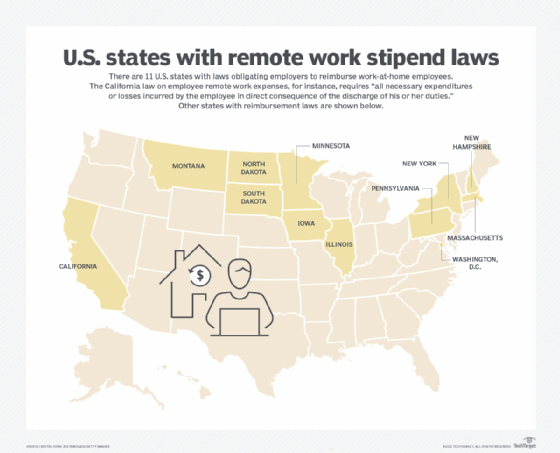What You Need to Know About Remote Work Laws in California
Whenever I reflect on working from home I recall my cousins impressive juggling act of balancing her job and kids all within the cozy confines of her house. However she soon found herself questioning her entitlements as a remote worker. This made me recognize the significance of being familiar with the guidelines surrounding remote work, particularly in California where the regulations are quite comprehensive. Knowing these rules can spare you a lot of hassles and streamline your experience working from home.
How California Defines Remote Work

In California remote work is defined as performing job tasks outside of the companys physical office. This could mean working from home a co working space or even a café. Now heres the catch – its not solely about lounging around in your pajamas. The state regulations view remote work similarly to how they treat regular office jobs. Therefore all the standard employment laws are in effect whether youre sitting at your desk in the office or using your laptop at home.
For instance if your supervisor requests that you work remotely they are still obligated to make sure you receive the same salary as if you were commuting to the office daily. I recall a friend mentioning that she believed working from home would result in a pay cut since she wouldnt be utilizing company premises. However that notion is incorrect. Your entitlements remain unchanged regardless of your location. In California employers are required to treat all employees fairly whether they are working remotely or on site.
Key Employee Rights for Remote Workers

Even if you’re doing your job from home you still have rights. California law ensures that. I’ve spoken to many people who are concerned that working remotely comes with diminished rights. However that’s not true.
As a remote employee in California you have certain rights and benefits.
- Wages: You must be paid at least the minimum wage, just like in a traditional office setting.
- Overtime: If you work more than 8 hours a day or 40 hours a week, you’re entitled to overtime pay.
- Meal and rest breaks: You still have the right to these, even if you’re at home. Make sure you take them!
- Non-discrimination: Whether remote or in-office, the law prohibits any kind of discrimination.
- Health and safety: Your employer should make sure your work-from-home setup is safe and meets basic ergonomic standards.
Working from home doesn’t mean you’re no longer covered by legal protections. In fact it serves as a reminder that your rights remain intact regardless of your work location. So remember that the next time you’re trying to balance emails and doing laundry!
Employer Responsibilities in Remote Work Setups

Every time I reflect on remote work I’m reminded of a chat I had with a coworker who was annoyed with his companys approach to it. He believed that just because he was working remotely his employer ceased to show concern for his welfare. However in California the legislation tells a story – employers still bear a lot of responsibilities.
An employer is still accountable even if you’re not physically present at work. Here are some of the important duties they have.
- Providing Equipment: Employers must ensure you have the right tools to do your job. This could be anything from a laptop to specific software. If you need a stable internet connection or a desk chair for better posture, they may need to cover that as well.
- Ensuring a Safe Environment: Although you’re at home, your employer is still responsible for making sure your workspace is safe. That means considering things like ergonomics – making sure you’re sitting in a way that won’t harm your body long term.
- Clear Communication: Just because you’re out of sight doesn’t mean you should be out of mind. Employers must maintain clear and consistent communication about tasks, expectations, and even health and safety concerns.
- Tracking Work Hours: It’s up to the employer to ensure accurate tracking of your work hours to comply with wage and hour laws. That means if you’re working extra hours, they need to know about it.
In California remote work is taken seriously and so should employers. They need to ensure that the same workplace safeguards are in place even if your office has moved to your living room.
Wage and Hour Laws for Remote Workers
I recall a time when a friend began her remote job and had concerns that her boss might exploit the flexibility and expect her to be available around the clock. Its a worry that many share but the wage and hour laws in California are quite explicit about this matter. Remote employees have the right to the same safeguards as any other worker.
Let’s break down what this means:
- Minimum Wage: You must earn at least the California minimum wage, no matter where you’re working from.
- Overtime Pay: If you work more than 8 hours in a day or 40 hours in a week, you are entitled to overtime pay. Yes, even from the comfort of your home.
- Meal and Rest Breaks: Just because you’re at home doesn’t mean you can skip breaks. You’re entitled to a 30-minute meal break if you work more than 5 hours and a 10-minute rest break for every 4 hours worked.
- Accurate Time Tracking: Employers must ensure your hours are tracked properly. If you’re working off the clock, that’s a big no-no. Keep a personal log if you’re ever unsure.
These regulations are in place to safeguard you from excessive workloads and to ensure that your salary accurately reflects the level of effort you invest. Therefore if your boss requests a little more work beyond hours, remember to stand up for your entitlements.
Workplace Safety Rules for Remote Employees
When I began working remotely I quickly realized that my posture took a hit from spending hours at my dining table. It didn’t take long for me to understand that ensuring a safe work environment isn’t solely about heavy equipment or risky settings. Even in the comfort of our homes safety is important.
In California, its the duty of employers to ensure that your remote work environment is secure. It may seem odd considering you have control over your home but let me explain how it goes:
- Ergonomics: Your employer should provide guidance on how to set up a comfortable and safe workspace. This includes things like proper chair height, screen positioning, and lighting.
- Workplace Injury Coverage: If you get injured while working remotely, you may still be covered under workers’ compensation. That’s why it’s important to keep your workspace safe and follow any safety guidelines your employer provides.
- Mental Health: Safety isn’t just physical. Employers should also ensure that the remote work setup doesn’t take a toll on your mental health. Regular check-ins and access to mental health resources can make a huge difference.
Taking care of your well being is crucial whether you’re working from home or in an office. It’s a shared responsibility – your employer should offer assistance but you also play a role in setting up a workspace that prioritizes safety.
Reimbursement for Work-Related Expenses
I recall a friend venting to me over the phone, expressing her annoyance with the question, “Do I really have to cover the costs of my internet just because I’m working remotely?” This is a worry among remote employees. However in California the law supports you. If you utilize your own resources such as internet, phone or even electricity for work purposes your employer is required by law to reimburse you for those costs.
According to California Labor Code Section 2802 employers are obligated to reimburse employees for their necessary work related expenses. This may encompass
- Internet costs: If you’re working from home and using your personal Wi-Fi, a portion of that bill could be reimbursed.
- Phone bills: Any work-related calls made from your personal phone should be compensated.
- Office supplies: If you need items like paper, pens, or even a printer for your work, those costs should be covered.
- Electricity: While not commonly reimbursed, if your electricity usage increases significantly due to remote work, your employer might be responsible for that too.
One thing I picked up on is the importance of keeping tabs on these expenses. I used to be a bit reluctant to request reimbursement but eventually I came to understand that these little costs can accumulate. Your company is obligated to cover these so dont hold back in voicing your concerns and claiming what truly belongs to you.
How COVID-19 Shaped California’s Remote Work Policies
The impact of the pandemic on our work routines was something none of us saw coming. I recall assuming it would only be a brief period of home office but here we are two years later with remote work now ingrained in our daily lives. In California the COVID-19 crisis not only transformed our work practices but also led to the establishment of policies aimed at safeguarding remote employees.
Throughout the COVID 19 crisis California implemented a set of temporary regulations to assist employees and employers in adjusting to the challenges. A few of these measures have now been established as permanent policies.
- Expanded Sick Leave: Employees exposed to COVID-19 were granted additional paid sick leave. Many companies extended these policies beyond the pandemic.
- Remote Work Flexibility: Employers became more open to hybrid or fully remote work models, and many have kept these flexible arrangements even after the peak of the pandemic.
- Safety Regulations: Companies had to ensure not only the safety of their office spaces but also provide remote employees with guidelines to maintain a healthy work-from-home setup.
The pandemic served as a reminder for businesses to acknowledge the value of remote work as a lasting solution. For workers it demonstrated that telecommuting is not just a perk but a practical choice deserving of legal safeguards.
FAQs on Remote Work Laws in California
Throughout the years, I’ve received numerous inquiries from my friends and relatives regarding the regulations surrounding remote work. Here are some of the most common ones that arise.
1. Do I have to pay for my own work equipment?
Your employer is required to cover any expenses that you incur while performing your job. This encompasses costs such as your computer, internet and phone bills.
2. Can my employer make me work overtime without paying extra?
No. The overtime laws in California are applicable to remote employees as well as those working in an office setting. If you exceed 8 hours of work in a day or 40 hours in a week you have the right to receive overtime compensation.
3. Am I entitled to breaks while working from home?
Absolutely. Remote employees in California still have the right to take meal and rest breaks as per the law. Make sure to keep a record of your working hours and take your breaks as needed.
4. What if I get injured while working from home?
If you get hurt while working you might qualify for workers compensation even if it occurs at home.
5. Can I switch between remote and office work?
Whether you can switch to a hybrid work model after COVID will depend on your employers policy. While many companies have adopted hybrid models it ultimately comes down to what your employer decides.
These are merely a handful of inquiries, yet should you ever feel uncertain, dont hesitate to contact HR or legal professionals for guidance.
Conclusion on Remote Work Laws in California
With remote work becoming a part of our routine it’s crucial to know your rights and duties as a remote worker in California. I’ve witnessed how it’s easy to forget about matters like reimbursement or break times when you’re balancing work from home. However California law safeguards you regardless of where you work. Whether it’s receiving pay for your overtime or getting your internet bill covered these regulations exist to support you. So as you set up your home office remember these protections they are there for a purpose.


